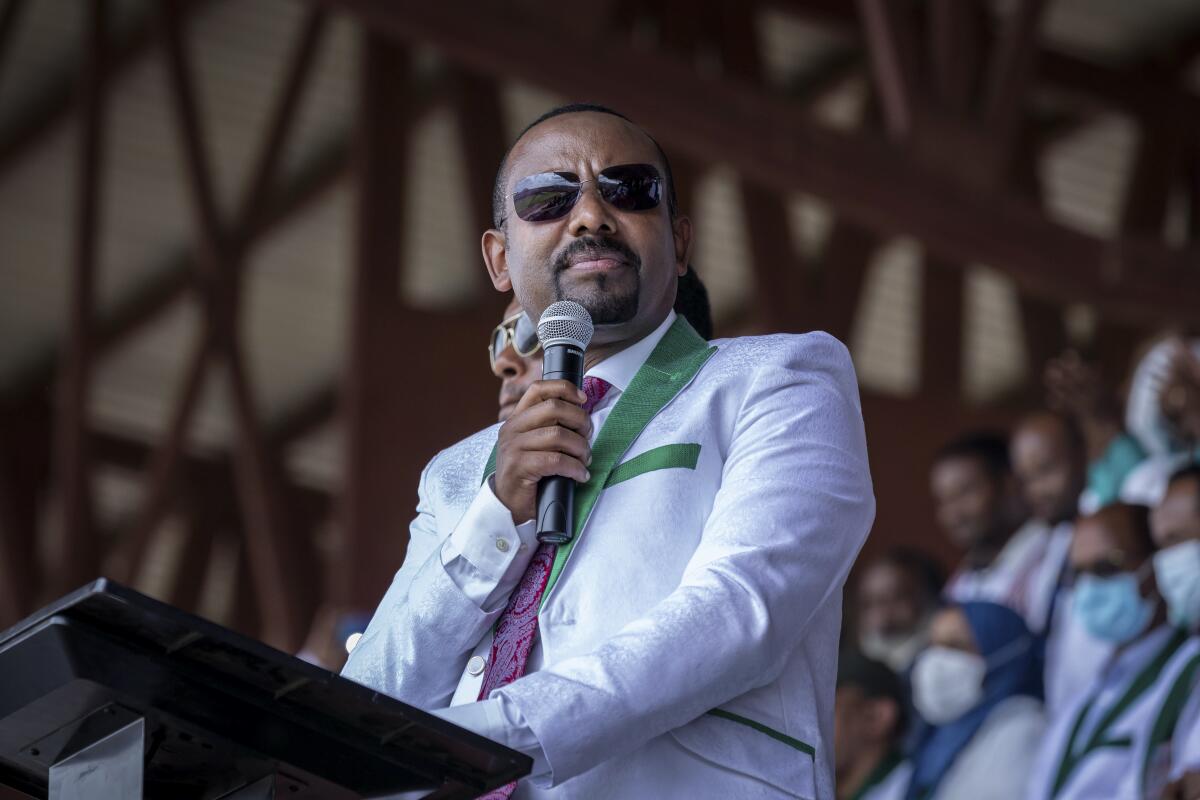Facebook removes Ethiopian prime minister’s post for inciting violence

- Share via
NAIROBI, Kenya — Facebook says it has removed a post by Ethiopia’s prime minister that urged citizens to rise up and “bury” the rival Tigray forces who now threaten the capital as the country’s war reaches the one-year mark.
Prime Minister Abiy Ahmed’s post on Sunday violated the platform’s policies against inciting and supporting violence, said Emily Cain, spokeswoman for Facebook’s parent company, Meta. It was taken down Tuesday morning, she said.
“The obligation to die for Ethiopia belongs to all of us,” Abiy said in the post, which called on citizens to mobilize “by holding any weapon or capacity.”
Abiy is still regularly posting on the platform, on which he has 3.5 million followers. The United States and others have warned Ethiopia about “dehumanizing rhetoric” after the prime minister in July described the Tigray forces as “cancer” and “weeds.”
Facebook has removed posts from world leaders before, although in rare circumstances. This year, the company deleted a video from then-President Trump in which he peddled false claims about election fraud after the deadly insurrection on Jan. 6 at the U.S. Capitol by a group of his supporters. Facebook said at the time that the video contributed to “the risk of ongoing violence.” Just last week, the tech platform yanked a live broadcast from Brazil President Jair Bolsonaro because he made false claims about the COVID-19 vaccines.
Cain did not say how Facebook was made aware of the Abiy post, which the Nobel Peace Prize-winning prime minister made as Tigray forces took control of key cities over the weekend that put them in position to move down a major highway toward the capital, Addis Ababa.
Alarmed, Abiy’s government this week declared a national state of emergency with sweeping powers of detention and military conscription. The prime minister on Wednesday publicly repeated his call to bury the Tigray forces as he and other officials marked one year of war.
Meanwhile, Ethiopia’s highly polarized social media this week saw a number of high-profile posts targeting ethnic Tigrayans, some even suggesting they be placed in concentration camps.
Thousands of people have been killed in the war between Ethiopian and allied forces and Tigrayans who long dominated the national government before Abiy took office. The United Nations human rights chief said Wednesday that she had received reports of thousands of ethnic Tigrayans being rounded up for detention in recent months.
Former Facebook product manager-turned-whistleblower Frances Haugen last month singled out Ethiopia as an example of what she called the platform’s “destructive impact” on society. “My fear is that without action, divisive and extremist behaviors we see today are only the beginning,” she told the Senate consumer protection subcommittee. “What we saw in Myanmar and are seeing in Ethiopia are only the opening chapters of a story so terrifying, no one wants to read the end of it.”
Meta spokeswoman Cain declined to say how many staffers it has in Ethiopia or how many are dedicated to detecting violent speech in Ethiopia on its platform, but she said the company has the capability to review posts in Somali, Amharic, Oromo and Tigrinya. She also said it has a team that includes people from Ethiopia or who have spent time in the country.
But Berhan Taye, a researcher in digital rights based in neighboring Kenya who tracks social media on Ethiopia and regularly “escalates,” or reports, questionable posts to Facebook, told the Associated Press last week the platform wasn’t moderating in the Tigrinya language as recently as April.
Overall in Ethiopia, “if you report [posts] on the platform, it’s very highly likely to get no reply at all,” she said. “From the amount we escalate, and the number of replies we get, that tells you their internal system is really limited.”
More to Read
Sign up for Essential California
The most important California stories and recommendations in your inbox every morning.
You may occasionally receive promotional content from the Los Angeles Times.










